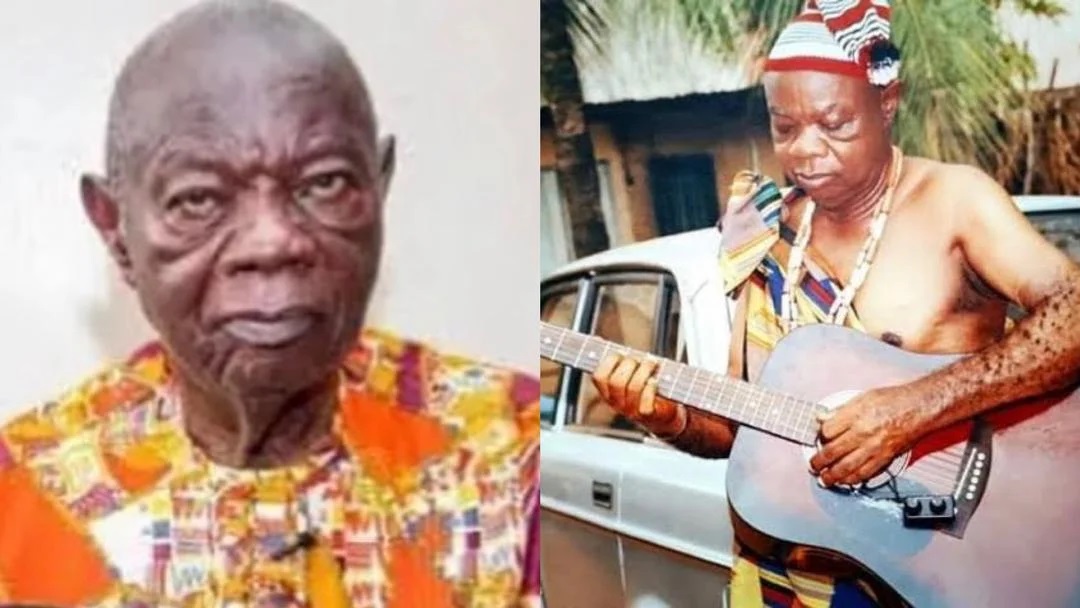Mike Ejeagha, the celebrated Highlife legend renowned for infusing Igbo folklore and proverbs into his music, has passed away at the age of 95.
Ejeagha died on Friday evening at approximately 8 p.m. at the 32 Garrison Hospital in Enugu, following a prolonged illness.
His eldest son, Emma Ejeagha, confirmed the sad news in a conversation with Vanguard.
A dominant figure in Nigerian music during the 1980s, Mike Ejeagha was widely admired for his distinct style of Igbo folk music, which resonated across generations.
Born on April 4, 1930, in Imezi Owa, Enugu State, Ejeagha’s influence spanned over six decades, with his first major hit occurring in 1960, the year Nigeria gained independence.
Early Life and Career:
Mike Ejeagha’s musical journey began in his childhood in Enugu, where he was raised in Coal Camp.
He grew up in a civil servant family and attended St. Patrick’s Primary School, Ogbete, Enugu.
His passion for music started at a young age, learning to play the Ogene with a friend.
In 1945, he joined the Coal Camp Boys, a local music group, and began participating in friendly music competitions with other groups like the Ogui and Dodokido bands during Christmas celebrations.
At the age of 20, in 1949, Ejeagha apprenticed as a barber under Cyprain Ozochiawa, who also taught him to play the guitar.
By 1950, he was recruited by Joseph Ogbu to join his band as a guitarist, receiving payments for his performances.
This opportunity allowed him to hone his musical skills and acquire his own instruments, eventually leading him to form his band, Mike Ejeagha and the Merrymakers.
His talent caught the attention of Atu Ona, the controller of the Nigerian Broadcasting Service, who invited him to audition.
Impressed by his skills, Ona offered Ejeagha his own radio program, Guitar Playtime, which marked the beginning of his radio career.
Ejeagha later formed the Premier Dance Band and continued to rise in prominence as a radio personality.
The Biafran War and Radio Influence:
During the Biafran Civil War, Ejeagha disbanded his music group but continued to perform on the radio, notably with his program Igbo Play aired by Radio Nigeria.
To avoid the conflict, he relocated from Enugu to Umuahia, where he remained throughout the war.
Before the war, he had already recorded hits like “The Unfortunate Lady” (1957) and “Colliery Massacre” (1959) in collaboration with CT Onyekwelu of Niger Phone Records.
After the war, Ejeagha’s career flourished again when Nigerian Television Authority invited him as a guest presenter for the Akuko N’ Egwu program in 1972.
This program, which showcased his original folksongs, significantly boosted his fame and cemented his place in Nigerian entertainment history.
Personal Life:
Ejeagha married his first wife in 1959 and had three children before she passed away in 1963.
He remarried in 1965, with whom he had seven more children, all of whom are now married.
Legacy and Achievements:
Ejeagha’s contribution to Igbo music was profound.
Known for his storytelling style, his lyrics, laced with proverbs, offered a didactic approach that made his music both entertaining and educational.
He wrote all his songs in the Igbo language, and his work influenced both the folk and highlife genres in Nigerian music.
Throughout his career, he made over 300 recordings, many of which are preserved in the National Archives of Nigeria.
In 2018, popular Nigerian musician Kcee visited Ejeagha to seek his approval to use some of his songs, including “Ome Ka Agu” and “Ka Esi Le Onye Isi Oche” for Kcee’s 2021 album, Cultural Vibes.
Ejeagha’s influence continued to grow posthumously, with his 1983 song “Ka Esi Le Onye Isi Oche” gaining viral recognition in July 2024 after a dance challenge by comedian Brain Jotter.
In September 2024, Enugu State Governor Peter Mbah paid a tribute to Ejeagha by visiting him at his residence.
Governor Mbah renamed Abakpa Road after him during the inauguration of newly constructed roads in the state.
Controversies:
Ejeagha was involved in a legal dispute with his record label, Premier Records, in 2013 over producing a music video without the label’s consent.
However, the case was withdrawn after intervention from the Enugu State Government.
Conclusion:
Mike Ejeagha’s death marks the end of an era in Nigerian music.
Through his dedication to preserving Igbo folklore and his innovative approach to highlife, Ejeagha has left an indelible mark on the Nigerian music landscape.
His contributions to music and culture will continue to inspire future generations.


